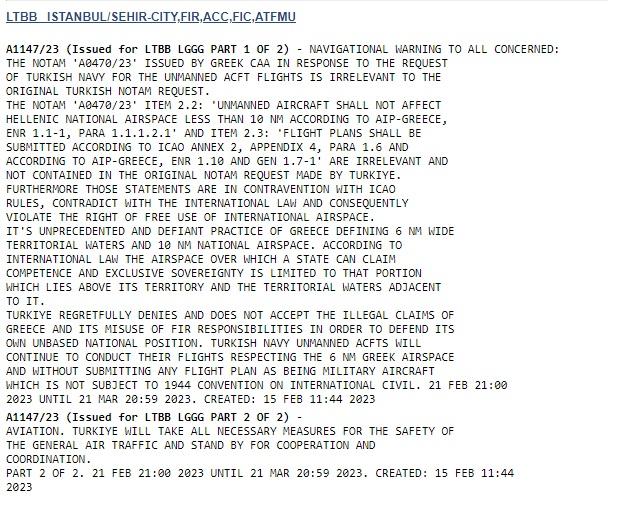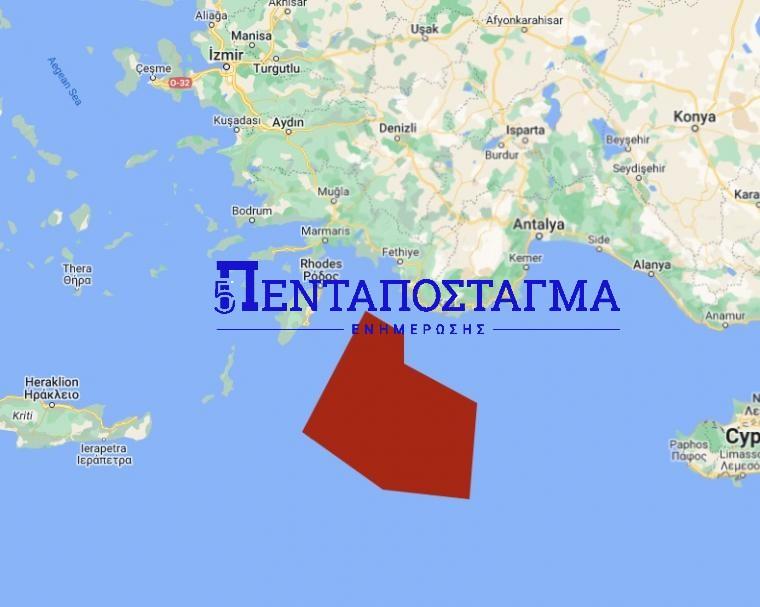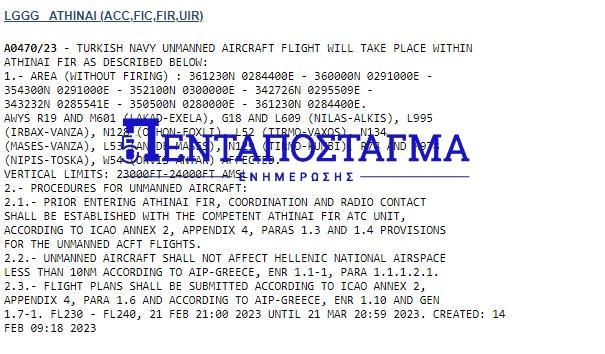It may be that on a verbal level the tones have dropped significantly, as it is a fact that there are no incendiary statements on the part of Turkey, however, as we have been writing for the last period of time in the Pentateuch, its revisionist agenda has not changed a millimeter, continuing to challenge at every opportunity of Greek sovereignty and sovereign rights.
In this context, eight days after the devastating earthquakes and specifically on Valentine's Day, Turkey requested to reserve an area between Rhodes and Kastelorizos for the flights of unmanned aircraft of the Turkish Navy from February 21 to March 21.
Greece issued a relevant NOTAM, stressing however that under no circumstances should the Greek airspace, which is at 10 nautical miles, be violated.
Ankara not only disobeyed the Greek NOTAM but reacted by issuing its own instructions to fliers stressing that there is no Greek airspace within 10 nautical miles and aircraft are to fly up to 6 nautical miles from Kastelorizo and Rhodes.
In addition to its own NOTAMs, it emphasizes that the unmanned aircraft of the navy that will fly in this area will not submit flight plans to Athens, as it claims, being military, they are not required to submit flight plans in international airspace, adding that they will settle this issue of passenger flight safety in the region.
National Airspace
The sovereignty of Greece in the air is exercised within 10 nm. from its coasts (pursuant to the Decree of September 6, 1931 (which defined for this purpose a special coastal zone 10 nm from its coasts), combined with laws 5017/1931, 230/1936 and 1815/1988). Greece, as a sovereign state, has chosen to exercise air sovereignty up to the 10 NM limit. of the territorial waters which he defined in 1931, in terms of aviation and policing issues, while in the sea he chose to exercise sovereignty until 6 n.m. (Law 230/1936 and Legislative Decree 187/1973).
Turkey continuously violates the Greek national airspace with military aircraft, often armed, which also carry out low-altitude flights even over inhabited islands.
This behavior of Turkey constitutes a flagrant violation of Greek sovereignty and may cause a heated episode. Turkey's claim regarding the opposition of the Greek national airspace to international law is unfounded for the following reasons:
a) given that "he who is entitled to the greater, is also entitled to the lesser", the exercise of sovereignty in the airspace until 10 p.m. is absolutely legal, since it does not exceed 12 n.m. defining the law of the sea as the upper limit of the extent of the coastal zone and national airspace,
b) Greece has notified the above legislation,
c) Turkey, since 1931 and for many decades accepted the range of 10 n.m. of the Greek national airspace without any protest or challenge, which constitutes tacit acceptance under international law. The relevant Presidential Decree was implemented from 1931 uniformly, without any protest regarding its legal basis.
Athens FIR
On December 7, 1944, the Convention on International Civil Aviation was signed in Chicago, which provided for the establishment of an International Civil Aviation Organization (ICAO). ICAO, with regional Air Navigation Agreements, established the limits of the areas of responsibility of each of its member states for the control of the airspace (Flight Information Region-FIR). The Athens FIR was demarcated in the context of the European regional air navigation conferences of 1950, 1952 and 1958.
The Athens FIR covers the Greek national airspace and additionally scattered parts of the international airspace, given that it does not concern issues of sovereignty, but of jurisdiction.
Turkey was present at the above conferences from the beginning and accepted the definition of the airspace for which Greece was designated responsible.
In accordance with ICAO rules and international practice, Greece requires, for civil flight safety reasons, that all aircraft, civil and military, submit flight plans before entering the Athens FIR.
Nevertheless, in August 1974, Turkey arbitrarily issued NOTAM 714 ("notice to airmen") attempting to extend its area of jurisdiction to the middle of the Aegean within the Athens FIR. Greece then declared the Aegean a dangerous area (NOTAM 1157). ICAO appealed to both sides without success. Finally, Ankara, in 1980, again unilaterally, revoked NOTAM 714 when it found that the measure harmed its interests and especially its tourism.
However, Turkey since then, arguing that the Chicago Convention does not apply to state aircraft, has consistently refused to submit flight plans for its military aircraft entries into the Athens FIR, thus committing numerous violations of the Air Traffic Rules and creating risks to the safety of civil aviation.
In this context, the Hellenic Air Force is forced to carry out procedures to identify unknown aircraft traces to the competent air traffic authorities, which have entered the Athens FIR without having submitted a flight plan.






